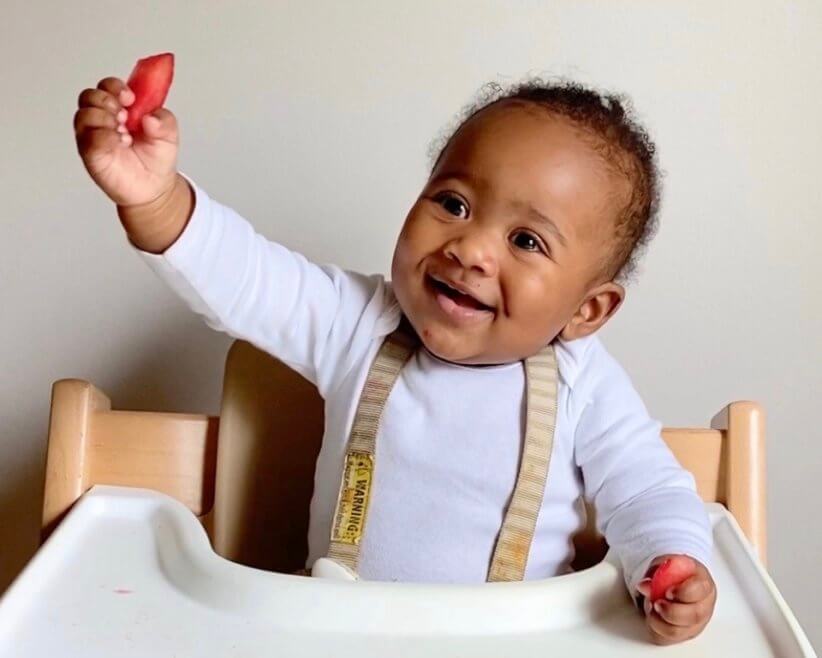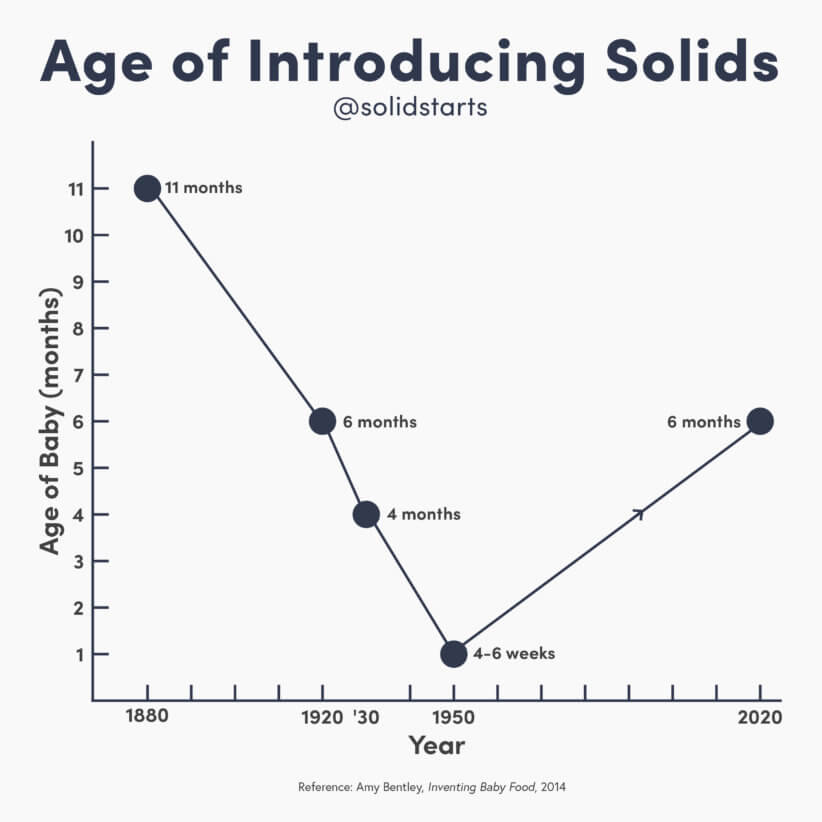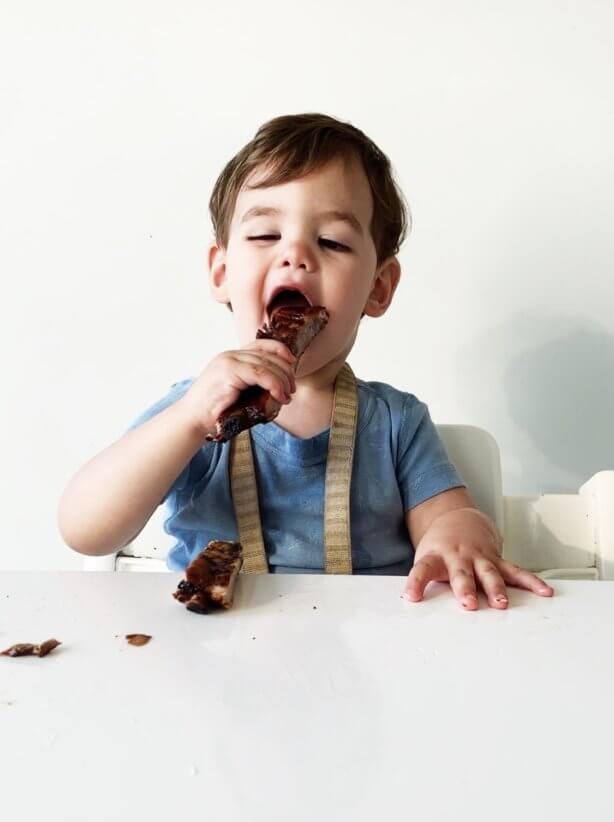
When to Start Solid Foods
Tips on starting solids from Mom-in-Chief Jenny Best and the feeding experts at Solid Starts
Just when you’ve settled into a schedule with your baby and grasped the whole bottle or breast-feeding thing, your pediatrician tells you it’s time to start solid food.
For some parents, this is exciting news — a world of flavor awaits! But for most, it’s a confusing time riddled with anxiety. What’s the best first food? Should we be certified in infant CPR? How do we actually do this?
Pssst…Looking for activities for your bigger kids? Check out Gymnastics Classes For Kids in New York City
Moving Target
Starting solids is confusing for good reason: the rules of the game have changed — a lot. According to Amy Bentley’s book “Inventing Baby Food,” in 1880, the average age of starting solids was 11 months old. Processed baby food gave rise in the 1920s, and by 1950, the average age of starting solids fell to mere 4-6 weeks old.
Today, the general consensus in the medical community is to start solids around 6 months old amid signs of readiness. While some pediatricians still advise starting babies on rice cereal and purées around 4 months old, it’s outdated advice: as of 2020, the American Academy of Pediatrics, U.S. National Institutes for Health, and World Health Organization all recommend waiting until your baby is around 6 months old and showing signs of readiness to introduce solids. What we know now that we didn’t know in the 1950s is that starting solids before 4 months old can displace the valuable nutrition from breast milk and formula. Starting solid food too early is also associated with unhealthy weight gain, both in infancy and early childhood, according to a study published in the Official Journal of the American Academy of Pediatrics.

Is Baby Ready for Solid Food?
Most healthy, full-term babies are ready to start eating solid food around 6 months old. However, make sure your baby has reached these critical developmental milestones before you start:
- Sitting: Baby can sit with minimal support
- Head Control: Baby can hold head upright and steady for the duration of a meal
- Reach & Grab: Baby can pick up objects and easily bring them to the mouth
- Interest: Baby intently watches you eat, mouths for food, or leans forward for it
If your baby is showing all of the above signs, they are ready! If your baby is showing just one or two, wait a week or two—babies develop rapidly, and a few days can make a world of difference when it comes to core strength, head control, and coordination.
While there is no perfect way to introduce solid food to your baby for the very first time, there are three general approaches to feeding:
- Baby-led weaning (infant self-feeds with finger food first)
- Spoon-feeding
- Combo feeding (a mix of spoon-feeding and self-feeding with finger foods).
Regardless of the approach you take, solid food should complement — not replace — breast milk or formula until your baby is at least 1 year old.

Starting Solids: Purées or Finger Food?
Contrary to popular belief, babies do not need to start solids with bland rice cereal and watery purées. While rice cereal and jars of watery carrots seem like the logical approach for starting solids, there is no developmental need for puréed food. In fact, the longer a baby is exclusively spoon-fed perfectly smooth purées, the more at risk they are for picky eating and food refusal according to a 2017 study published in “Current Nutrition Reports.”
Will you damage your child for life by spoon-feeding them for a couple of months? Of course not. But know that babies are hard-wired to explore food and instinctively know what they can handle. Babies are born with six protective reflexes (precursors to complex chewing) that exist solely to help them build a map of the mouth. And by 6 months old, babies are developmentally capable of feeding themselves without the need for spoon-feeding or purees. Our feeding professionals ardently believe that babies with early access to finger foods develop the oral-motor skills required for safe eating faster than spoon-fed babies. In fact, babies who start solids with finger foods are no more likely to choke on food than spoon-fed babies, according to studies published in the “Journal of Human Nutrition and Dietetics” and “Pediatrics.”
This knowledge — and the hope of preventing picky eating — is why many parents turn to a finger food first approach when starting solids. Plus, parents who serve babies from the family meal lay the groundwork for successful, non-picky eating habits:
- Everyone in the family eats the same healthy food.
- The baby or child does not get something different or special.
- The child has control over if they eat and how much they put in their mouth.
Best First Foods for Baby
Nutritionally, the best first foods for babies are those high in iron, protein, calcium, vitamins A, C and D, and zinc. Eggs, lentils, beans, red meat, and salmon are among our favorite first foods for babies because they are rich in these nutrients and include the omega fatty acids needed for optimal brain growth.
But, food is cultural. In addition to nutrients, consider which foods you and your family love when choosing your baby’s first foods. Serve first foods as part of a family meal from the start, where you can model the enjoyment and skills involved in eating. So, take off that highchair tray, pull them up to the table for family dinner, and enjoy your meals together.
Want to learn more? Visit SolidStarts.com or follow along on Instagram @solidstarts.
About Solid Starts
Solid Starts is a mom-led team of pediatric food and feeding experts, doctors, nutritionists, and dietitians and is the world’s first comprehensive platform for starting solids. Solid Starts hosts First Foods℠, a free food database for babies that will ultimately house every edible ingredient in the world, complete with step-by-step instructions and how-to videos for introducing real food to babies. Operating as a social enterprise, Solid Starts offers complimentary resources for those in need. The platform serves more than 300,000 people from 175 countries worldwide and is the fastest-growing baby account on Instagram @solidstarts.
Reviewed by:
Kimberly Grenawitzke, OTD, OTR/L, SCFES, IBCLC, CNT
Sakina Bajowala, MD, FAAAAI. Board-Certified Allergist & Immunologist (allergy section)
Rachel Ruiz, MD Board-Certified General Pediatrician and Pediatric Gastroenterologist























